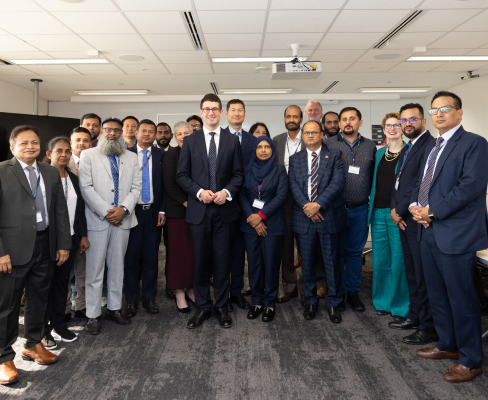

This training program fostered robust senior executive engagement and endorsement from all SARIC priority countries, spanning both governmental and private sectors, in the domain of road safety management. The training program aimed to optimize Australian expertise to empower individuals and institutions involved in regional connectivity, thereby maximizing the impact of Australian training resources.
This Road Safety Management short course was designed to:
- Address identified knowledge gaps and skill deficiencies highlighted by World Bank and IFC projects, facilitating a well-rounded capacity enhancement among participants in road safety. This includes navigating emerging challenges, adopting innovative approaches, and mastering techniques within the broader spectrum of transportation infrastructure management
- Offer participants broader exposure and deeper insights into Australian industry and governmental networks, enriching their professional relationships and fostering collaborative opportunities
- Cultivate a spirit of cross-border collaboration among regional stakeholders, promoting the exchange of knowledge and best practices across borders
- Influence the mindset, behaviours, and practices of personnel engaged in significant regional infrastructure endeavours, as well as key ecosystem stakeholders, through strategically curated SARIC training sessions and networking platforms
- Facilitate the integration and mainstreaming of Gender Equality, Diversity, and Social Inclusion (GEDSI) principles within the design and execution of transport sector projects. By advocating for the adoption of relevant best practices, we aim to catalyse transformative outcomes that prioritize inclusivity, accessibility, and safeguards for vulnerable populations
This short training was delivered through a blended learning model (online as well as in the classroom with site visits, guest speakers and engagement with relevant organizations).
The blended learning approach included three components:

During this period, the training partner set the learning context and expectations by informing participants about the learning outcomes, assessment rules, training topics, guidelines for their stay in Australia, and any preconditions. Participants were introduced to the service provider’s team and fellow participants, and they received information about Australian culture, expected behaviour, reasonable accommodations, and access to facilities. This virtual phase aimed to create a comfortable learning environment and will conclude with the sharing of digital handouts and training materials.

This component involved a 10-day study program and experiential activities delivered in Australia. In addition to classroom-based learning, this component included engagement with expert panels (face-to-face or virtually) and targeted site visits that will enhance the practical orientation of the training. These additional activities were planned by the training partner in line with the course content. A networking event was organised, offering networking opportunities and knowledge exchange with senior officials and private sector representatives from the electricity sector. The phase concluded with collaborative learning reviews, individual reports, and the SARIC in Workplace (SiW) plan.

The training partner engaged with the SARIC trainees during/after one month of their return from training in Australia by providing mentoring support on their SiW plans. This included demand driven, short mentoring sessions and concluded with a presentation on progress on their SiW plan with the entire cohort.
This phase helped relate the concepts learned to the workplace, thus reinforcing the training undertaken.
Through an immersive blend of e-learning modules, classroom sessions, expert panels, site visits, and collaborative engagements with Australian and global experts, government entities, and private enterprises, participants gained:
- The ability to shape the knowledge, attitudes, and behaviours of personnel involved in significant regional infrastructure ventures and key ecosystem stakeholders, facilitated through targeted SARIC training and networking initiatives
- Enhanced skills and knowledge in management techniques critical to the planning, development, and operation of roads, aligning with governmental objectives while addressing stakeholder needs and priorities IncreasedApp
- Collaboration among participants, fostering a collective effort to apply best practices and address challenges in South Asia's road safety management landscape
- Networking opportunities that cultivate alliances and promote a culture of innovation within government, encouraging exploration of novel approaches to problem-solving and project execution